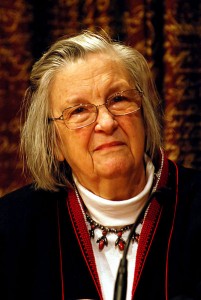
Elinor Ostrom, the first woman to win the Nobel prize for Economics (which she shared with Oliver Williamson), passed away yesterday. She was 78.
The official announcement from Indiana University, where Ostrom spent most of her career, is here.
With Ostrom’s passing, social science lost one of its greats. If you’ve never read anything by Ostrom, you should start with her 1990 book, Governing the Commons. NPR’s Planet Money has a nice writeup:
She was famous for challenging an idea known as the tragedy of the commons — the theory that, in the absence of government intervention, people will inevitably overuse a shared resource.
So, for example, if a village shares a pasture, it’s in the individual interest of each farmer to graze his cattle as much as possible on the pasture even though, in the long run, overgrazing may ruin the pasture for everyone.
“It’s a problem, it’s just not necessarily a tragedy,” Ostrom told us when we spoke to her in 2009. “The problem is that people can overuse [a shared resource], it can be destroyed, and it is a big challenge to figure out how to avoid that.”
But, she said, economists were “wrong to indicate that people were helplessly trapped and the only way out was some external government coming in or dividing it up into chunks and everyone owning their own.”
And here is a lecture by Ostrom, on sustainable development and the tragedy of the commons:
The one anecdote I distinctly remember being told about Ostrom, from one of her coauthors, was that her secret was that she worked all the time, and that it was not uncommon to receive an email from her very early in the morning or very late at night — or both.
In fact, here is proof that Ostrom worked until the very end: an op-ed that carries her name in the byline published the morning of her passing.
I did not know Elinor Ostrom personally, but I have a few friends who did. My condolences to those friends and to those of you who also knew her.
(HT: Lou Brown for the Project Syndicate article; Mike Munger for the video lecture.)
Trivial Confirmations of the Obvious?
An op-ed by Jacqueline Stevens a few weekends ago in the New York Times made a lot of waves. In it, Stevens — a professor in the political science department at Northwestern University — essentially declares herself in favor of eliminating National Science Foundation funding for political science research.
Her reason? Political scientists are lousy forecasters.
This post not going to be a response to Jacqueline Stevens. GWU’s Henry Farrell has a great response here, Stanford’s James Fearon — whose work is singled out by Stevens as the type of work she dislikes — has his own response here, and forecaster extraordinaire Jay Ulfelder responds here.
What I am going to take issue with here instead is a two-sentence excerpt. Indeed, in her op-ed, Stevens writes of empirical research in political science that
Many of today’s peer-reviewed studies offer trivial confirmations of the obvious (…). I look forward to seeing what happens to my discipline and politics more generally once we stop mistaking probability studies and statistical significance for knowledge.
Trivial confirmations of the obvious, really?